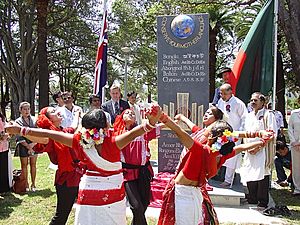Native speaker facts for kids
A native speaker is a person who has learned a language from birth or during their early childhood. This language is often called their first language or mother tongue. It's the language they grew up speaking at home, with their family, and in their community. Because native speakers learn their language naturally from a very young age, they usually speak it very well. They understand all its little rules and sounds without even having to think about them. For someone who speaks only one language, this is their only language. For people who speak many languages, it's usually the first one they learned. This first language helps shape who they are and how they connect with others.
Contents
What is a Native Speaker?
A native speaker is someone who has acquired a language naturally, usually from their parents or the people around them, in their home country. This means they didn't learn it in a classroom later in life. Instead, they picked it up just by listening and trying to communicate as a baby and young child. This natural learning process helps them develop a deep understanding of the language. They often know the language's grammar, vocabulary, and pronunciation very well, even without formal lessons.
How We Learn Our First Language
Learning a first language happens almost like magic! Babies and young children are like sponges. They listen to the sounds and words spoken around them every day. They start to copy these sounds, then words, and then simple sentences. This process is called language acquisition. It's different from learning a second language later on, which often involves studying rules and vocabulary. A native speaker's brain is wired to understand and use their first language very quickly and easily. This is why they can often speak it fluently and correctly without much effort.
Native Speakers in Language Teaching
The term "native speaker" is also often used in the world of language education. For example, when people want to learn English in countries where English is not the main language, they often look for teachers who are native English speakers. This is because native speakers can offer a natural way of speaking and a deep understanding of the language's culture and everyday use. They can help students learn how real conversations sound and how to use words in the right way.
Images for kids
-
The monument for the mother tongue ("Ana dili") in Nakhchivan, Azerbaijan



